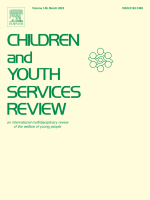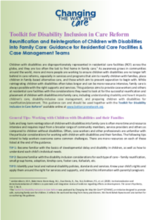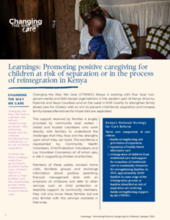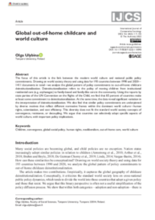Displaying 51 - 60 of 956
This paper advances the global and transnational agency approach to the study of out-of-home childcare, specifically the institutionalization of children.
The aim of this qualitative study published in the Children and Youth Services Review journal was to describe care leavers’ experiences of social inclusion in Finland. The results can provide new insight into a vulnerable, marginally researched group with high support needs and a propensity for social exclusion.
In this policy brief published by Eurochild and UNICEF, researchers assess the 20 available European Child Guarantee National Action Plans (NAPs) and issue recommendations to examine their coverage of children in alternative care.
This conceptual article describes how, in terms of organization theories, shifts in the chronological transition to adulthood produce “weak” constellations of participation during the process of leaving care. The authors highlight the different degrees of participation by those leaving care and the ways in which it is expressed.
This study aimed to describe the perception of caregivers and the role of professionals in the process of family reintegration and adoption of children and adolescents with disabilities in a host institution in Belém/PA, Brazil.
Drawing from the learning from participatory research in Latin America and the Caribbean as well as Australia, this webinar introduced different approaches used to engage individuals with lived experience of alternative care in research efforts.
This guidance aims to provide case workers and others at residential care facilities with the considerations they need to look at for the successful reunification and placement of children with disabilities into family care, including understanding disability and how it impacts children’s care, disability-inclusive case management, and preparing children with disabilities for reunification/placement.
This CTWWC brief describes the family strengthening approach and the people who work with families and children. It shares reflections from facilitators of parenting sessions and the caregivers, themselves.
The focus of this article is the link between the modern world culture and national public policy commitments. Drawing on world society theory and using data for 193 countries between 1990 and 2020—1411 documents in total—the authors analyze the global pattern of policy commitments to out-of-home childcare deinstitutionalization.
This webinar examines the Bright Spots programme findings in relation to careleavers 'interdependence'.








